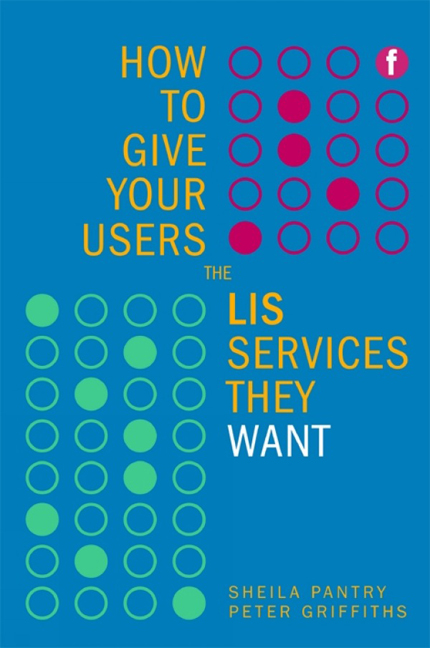Book contents
- Frontmatter
- Contents
- Preface
- 1 Why this book?
- 2 Understanding users – the what, why, where, when, how and who
- 3 What is the current knowledge about your users and their needs – is it really predictable?
- 4 Great expectations: how LIS professionals can manage and train users
- 5 Using information about past user behaviour
- 6 Making the most of knowing your users
- 7 Keeping track of changes in what users want
- 8 Tracking the future
- 9 Future perfect?
- Appendix 1 Reading list and references
- Appendix 2 Where to go for further information
- Index
1 - Why this book?
Published online by Cambridge University Press: 08 June 2018
- Frontmatter
- Contents
- Preface
- 1 Why this book?
- 2 Understanding users – the what, why, where, when, how and who
- 3 What is the current knowledge about your users and their needs – is it really predictable?
- 4 Great expectations: how LIS professionals can manage and train users
- 5 Using information about past user behaviour
- 6 Making the most of knowing your users
- 7 Keeping track of changes in what users want
- 8 Tracking the future
- 9 Future perfect?
- Appendix 1 Reading list and references
- Appendix 2 Where to go for further information
- Index
Summary
In these turbulent times, library and information service (LIS) staff at all levels need constantly to keep one step, or more, ahead of the users.
Today's LIS users do not behave like those who used the services ten or twenty years ago, and today's user behaviour will change again, probably even more rapidly than we have seen in recent years. Having the strategies to deal with this is not just an issue for senior managers and the leaders of the profession. Nor is it just an issue for the public library sector. It is an issue for every type of library, and for library and information professionals at every level – and in every country.
While we recognize that nothing stands still in this information world of ours, we believe that the focus of all our attention remains (and always has been) the user. Without users there is no real reason for a library and information service to exist. Experience will give the manager an advantage – but do we need to get older to be able to assess and forecast what the users will do next as far as information searching, retrieval and subsequent usage of the data is concerned? LISs worldwide spend enormous sums of money on staff, purchasing services, materials and other systems, but do they really understand what exactly makes the user tick?
In recent years many ideas, often from other sectors, have taken off and been exploited in new and exciting ways. They are being communicated in real time to world wide audiences. Many new applications are being developed quickly on the back of this for services such as Facebook, MySpace, Twitter and Google Maps. Major trends are emerging and converging, such as Twittering and mash-ups, conversations and open linked data. And at last the semantic web is becoming a reality as more organizations publish their data in open formats that these new tools can access and exploit creatively across the web. Everyone in the marketplace can participate, including publishers, library and information centres and users. Many people who never entered an LIS are participating and the information world of ours must shift its dynamics to embrace these new types of users. The barriers to entry are minimal – the costs of participating zero.
- Type
- Chapter
- Information
- How to Give Your Users the LIS Services They Want , pp. 1 - 12Publisher: FacetPrint publication year: 2009



